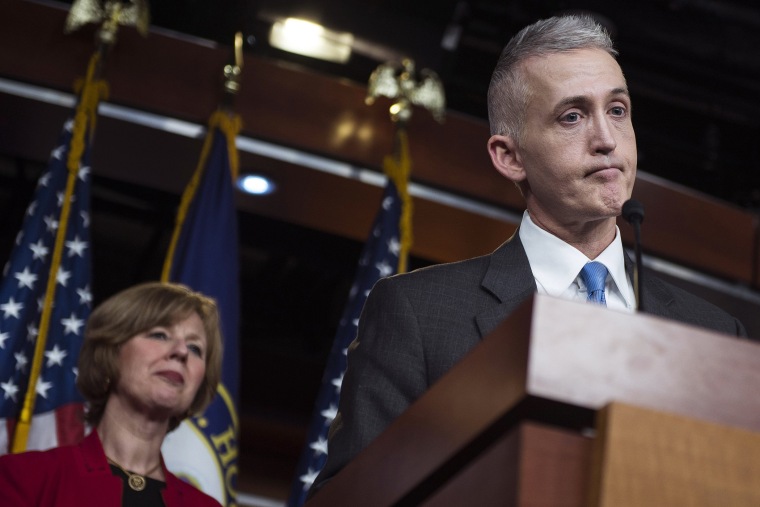House Majority Leader Kevin McCarthy (R-Calif.)
conceded again this morning that he made a mistake when he accidentally told the truth last week about his party's Benghazi committee. "I could have been more clear in my description of what was going forward," the GOP leader
said, in yet another awkwardly worded sentence.
Meanwhile, Rep. Trey Gowdy (R-S.C.), the head of the Republicans' Benghazi scheme, told the
Washington Post he spoke to McCarthy last week, though the committee chairman
still sounds pretty annoyed by the Majority Leader's accidental candor.
“I heard from [McCarthy] at 6 a.m. the next morning,” said Gowdy, whose name was recently floated for House majority leader. “How many times can somebody apologize? Yes, he’s apologized as many times as a human can apologize. It doesn’t change it. It doesn’t fix it. The only thing you can say is, instead of listening to someone else’s words, why don’t you look at our actions?” “Kevin is a friend, which makes the disappointment, frankly, even more bitter. If faith tells you to forgive somebody...” Gowdy trails off. “It’s tough,” he says after a moment.
I'm going to go ahead and put Gowdy in the "still unhappy with McCarthy" category.
The congressman's feelings notwithstanding, the effort to shift attention away from McCarthy's confession and towards the committee's "actions" doesn't necessarily help. On the contrary, it largely does the opposite.
This week, Democrats on the Benghazi committee released
a video and
a detailed fact-sheet that served as a compelling indictment against the GOP panel's political efforts.
And therein lies the GOP's most serious problem: McCarthy didn't screw up by saying something wrong; he screwed up by publicly repeating a fact Republicans prefer to keep under wraps. In other words, McCarthy's mistake was telling a secret, not telling a lie.
Democrats doubled down Tuesday night on their push to end the House Select Committee on Benghazi by seeking a vote on a floor amendment to kill the panel. The move by Rep. Louise Slaughter (R-N.Y.) was blocked by the Republican majority on the House Rules Committee. But the amendment offers a hint at Democrats’ strategy to weaken the panel ahead of testimony from Hillary Clinton on Oct. 22.
Florida Democrat Alan Grayson filed an ethics complaint Wednesday against House Majority Leader Kevin McCarthy, R-Calif., and Rep. Trey Gowdy, R-S.C., alleging they violated federal law and House rules by using official funds appropriated to the Benghazi Committee to pay political or campaign-related expenses. “This represents the new McCarthyism — the misuse of [official] funds for political purposes to vilify a political opponent,” Grayson told CQ Roll Call. He said the House Select Committee on Benghazi, chaired by Gowdy, is an “effort to embarrass” Democratic presidential contender Hillary Rodham Clinton.
Phase III, according to a
Washington Post report, is likely to include a Democratic member filing "a privileged resolution that could call for a rebuke of Kevin McCarthy over his gaffe and/or for disbanding the Benghazi panel. Though neither will pass, it will force the GOP rank-and-file to take multiple, uncomfortable votes of confidence in their new leader."
It's against this backdrop that the editorial board of the
New York Times argues today that it's time to end this ridiculous political exercise.
